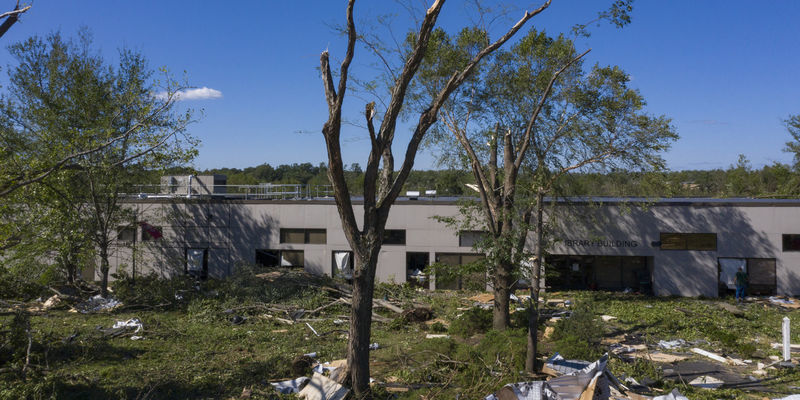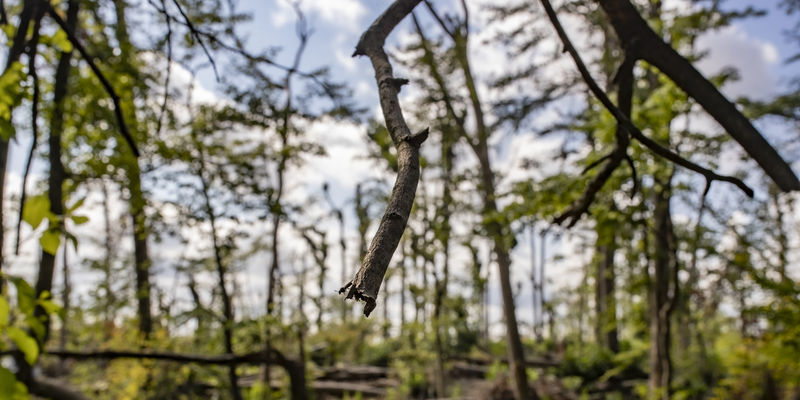Temple exploring how to best utilize Ambler Campus
This summer, the university issued a request for proposal to consultants and advisors to provide services in support of its efforts to reimagine Temple’s Ambler Campus.

More than four years ago, on Sept. 1, 2021, an EF2-level tornado traveled through Temple University’s Ambler Campus, destroying buildings, uprooting hundreds of trees and forever changing the campus’ aesthetics.
In the years since, the university has worked to rebuild and reimagine Temple Ambler, expanding its research portfolio and launching new initiatives like Outdoor Experiential Education activities. This past summer, the university supplemented these efforts by issuing a request for proposal (RFP) from consultants and advisors to help develop a long-term vision for the campus.
“One of the most frequent conversations that I have had over the past year relates to the Ambler Campus. It is widely known that this is a vastly underutilized space, so it is up to us to change that,” Temple President John Fry said. “That is really the impetus behind this RFP process. At one time, this was a campus with several thousand students, but that has changed in recent years. Our goal here is to make sure we have a comprehensive plan that evaluates all potential options for Ambler moving forward. It is a tremendous asset, so we need to make sure we are taking advantage of it.”
Since issuing its RFP in August, Temple has reviewed more than a half dozen proposals and conducted follow-up interviews. It hopes to have a vendor selected within the next few weeks.
“For the university, this is about recognizing the importance and significance of Temple Ambler and making sure that we are good stewards of its resources moving forward. So, our charge is to explore all options moving forward,” said Jonathan Reiter, senior associate vice president of business affairs and administration.
While the university will lean heavily on the recommendations of the firm that is chosen, some of the options that could be up for consideration include the development of a traditional branch campus, a private/public partnership, transforming the campus into an experiential learning campus or a potential sale.
“What is also special about this RFP process is that the Ambler community will be able to provide input into what opportunities will be explored,” said Vicki Lewis McGarvey, vice provost for University College and the director of the Ambler Campus. “It has been structured in a way that we are ensuring that the winning firm works with stakeholders in the Ambler community to guide potential recommendations for the campus.”
Over the last few decades, Ambler and its student body makeup have changed considerably. In the early 1990s, more than 5,000 students enrolled there. However, in the fall of 2024, just 647 students reported taking a course with only 230 of those students completing most of their coursework there. Students continue to express interest in attending Ambler, but that has been difficult with no residence halls on campus (East Hall and West Hall were heavily damaged and later removed after the tornado).
Ambler has taken on a new identity in the wake of the 2021 tornado as its value as a unique environmental research site has increased. About 10 acres of the campus are designated as a Smithsonian Institute Forest Global Earth Observatory site and its recovery is being studied as a “disturbance ecology laboratory.”
Additionally, just this fall, the U.S. Geological Survey (USGS) established a cooperative partnership to advance mutual goals centered on scientific research, environmental monitoring and water resource stewardship. This collaboration between USGS scientists and Temple researchers will include locating USGS Pennsylvania Water Science Center facilities at the Ambler Campus.
“If there is a positive that has come out of that situation, it has been the expansion of opportunities for students and faculty to use the arboretum’s gardens and natural environments as a living laboratory. The work being done by the Temple Ambler Field Station is one of the best examples of hands-on, field-based research experience that we have at the university,” McGarvey said. “Our task now is to build on Ambler’s strengths and leverage its assets, and we are confident that through this RFP process, we are on our way.”


